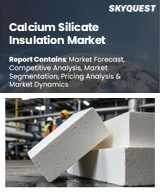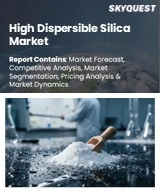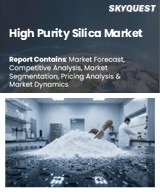
|
시장보고서
상품코드
1772556
실리카 시장 규모, 점유율, 동향 분석 보고서 : 제품별, 최종 용도별, 지역별, 부문별 예측(2025-2033년)Silica Market Size, Share & Trends Analysis Report By Product (Amorphous, Crystalline), By End-use (Building & Construction, Glass Manufacturing, Oil & Gas, Water Treatment), By Region, And Segment Forecasts, 2025 - 2033 |
||||||
실리카 시장의 성장과 동향 :
Grand View Research, Inc.의 최신 보고서에 따르면, 세계 실리카 시장 규모는 2033년까지 858억 6,000만 달러에 달하고, 2025-2033년 9.1%의 연평균 복합 성장률(CAGR)을 보일 것으로 추정됩니다.
고무, 농약, 구강 관리, 페인트 및 코팅 등 다양한 최종 이용 산업에서 실리카 수요 증가가 산업을 견인할 것으로 예측됩니다.
침전법 실리카는 시장에서 가장 널리 소비되는 제품입니다. 회전 저항 감소, 미끄러운 상황에서의 견인력 향상, 연비 효율 향상 등의 능력으로 인해 자동차 타이어와 같은 엘라스토머 제품의 보강에 이용되고 있습니다. 또한, 열가소성 필름의 안티 블로킹제, 페인트와 바니시의 매트제로도 사용됩니다.
신흥국을 중심으로 한 자동차 산업의 확대로 인해 세계 타이어 수요는 증가하고 있습니다. 이에 따라 주요 타이어 업체들은 인도와 같은 신흥국에서의 확장 프로젝트에 적극 나서고 있습니다. 예를 들어, 2018년 4월, Bridgestone India는 3억 4,000만 달러를 투자하여 향후 5년간 생산 능력을 두 배로 늘릴 계획을 발표했습니다. 이는 타이어 제조업체의 제품 수요를 촉진할 것으로 예측됩니다.
건설 분야에서는 실리카로 구성된 고성능 콘크리트(HPC)가 인프라 개발에 필요한 가장 중요한 첨단 재료 중 하나로 인식되고 있습니다. 실리카퓸으로 제조된 HPC는 강도가 향상되고 부식, 마모, 화학물질에 대한 내성이 높아집니다. 또한, 투과성이 낮고, 내구성이 향상되며, 지속가능성이 있어 콘크리트의 수명주기 비용 효율화를 실현합니다. 이 때문에 건설 분야에서 이 제품의 사용이 촉진될 것으로 예측됩니다.
시장 경쟁 구도은 시장 지위를 강화하기 위해 현재 많은 기업들이 시장 지위를 강화하기 위해 용량 확장에 노력하고 있음을 반영합니다. 예를 들어, 2018년 10월, 에보닉은 북미 타이어 산업 수요 증가에 대응하기 위해 남미 캐롤라이나 주에 침전법 실리카 공장을 설립했습니다.
실리카 시장 보고서 하이라이트
- 제품별로는 고경도, 열 안정성, 화학적 불활성 특성으로 인해 결정질 실리카가 2024년 매출 점유율 71.0% 이상을 차지하며 시장을 장악했습니다.
- 최종 용도별로는 유리 제조 부문이 2024년 시장 매출의 46.0% 이상을 차지하며 가장 큰 최종 용도 부문으로 부상했습니다.
- 또한, 건축 및 건설 산업도 큰 비중을 차지하고 있으며, 이는 각 지역의 인프라 정비와 도시화 진전을 배경으로 하고 있습니다.
- 아시아태평양의 실리카 시장은 급속한 산업화, 인프라 투자 증가, 자동차 소비 증가를 배경으로 2024년 전체 매출의 41.0% 이상을 차지하며 시장을 선도했습니다.
목차
제1장 조사 방법과 범위
제2장 주요 요약
제3장 시장 변수, 동향, 범위
- 시장 계통 전망
- 밸류체인 분석
- 기술 개요
- 규제 프레임워크
- 시장 역학
- 시장 성장 촉진요인 분석
- 시장 성장 억제요인 분석
- 업계 동향
- Porter의 Five Forces 분석
- 공급 기업의 교섭력
- 바이어의 교섭력
- 대체 위협
- 신규 진출업체의 위협
- 경쟁 기업간 경쟁 관계
- PESTLE 분석
- 정치
- 경제
- 사회 상황
- 기술
- 환경
- 법률
제4장 실리카 시장 : 제품 추정·동향 분석
- 실리카 시장 : 제품 변동 분석, 2024년 및 2033년
- 제품 전망
- 아몰퍼스
- 결정질
제5장 실리카 시장 : 최종 용도 추정·동향 분석
- 실리카 시장 : 최종 용도 변동 분석, 2024년 및 2033년
- 건축 및 건설
- 석유 및 가스
- 유리 제조
- 수처리
- 기타
제6장 실리카 시장 : 지역 추정·동향 분석
- 지역 분석, 2024년과 2033년
- 북미
- 제품별, 2021년-2033년
- 최종 용도별, 2021년-2033년
- 미국
- 캐나다
- 멕시코
- 유럽
- 제품별, 2021년-2033년
- 최종 용도별, 2021년-2033년
- 독일
- 영국
- 러시아
- 튀르키예
- 아시아태평양
- 제품별, 2021년-2033년
- 최종 용도별, 2021년-2033년
- 중국
- 인도
- 일본
- 한국
- 라틴아메리카
- 제품별, 2021년-2033년
- 최종 용도별, 2021년-2033년
- 브라질
- 중동 및 아프리카
- 제품별, 2021년-2033년
- 최종 용도별, 2021년-2033년
제7장 경쟁 구도
- 주요 시장 진출기업의 최근 동향과 영향 분석
- 쿠라릭크마트리크스
- 기업 분류
- 히트맵 분석
- 벤더 구도
- 원재료 공급업체 리스트
- 유통업체 리스트
- 기타 주요 제조업체 리스트
- 전망 있는 최종사용자 리스트
- 전략 매핑
- 기업 개요/상장기업
- Cabot Corporation
- Evonik Industries AG
- Imerys SA
- Nissan Chemical Corp.
- Oriental Silicas Corp.
- PPG Industries Inc.
- Solvay SA
- Tosoh Corporation
- WR Grace &Co.
- Wacker Chemie AG
Silica Market Growth & Trends:
The global silica market size is estimated to reach USD 85.86 billion by 2033, registering a CAGR of 9.1% from 2025 to 2033, according to a new report by Grand View Research, Inc. Rising demand for silica across various end-use industries such as rubber, agrochemicals, oral care, and paints and coatings is anticipated to drive the industry.
Precipitated silica is the most extensively consumed product in the market. It is utilized in the reinforcement of elastomer products, such as automotive tires, due to its ability to reduce rolling resistance, improved traction under slippery conditions, and enhanced fuel efficiency. It also acts as an anti-blocking agent in thermoplastic films and a matting agent in paints and varnishes.
The global demand for tires is increasing on account of an expanding automobile industry, especially in emerging economies. As a result, major tire manufacturers are aggressively involved in expansion projects in emerging economies like India. For instance, in April 2018 Bridgestone India announced plans to double its production capacity over the next five years at an investment of USD 304 million. This is anticipated to propel product demand from tire manufacturers.
In the construction sector, high-performance concrete (HPC) comprising silica has been recognized as one of the most significant advanced materials necessary for infrastructure development. HPC manufactured with silica fumes provides increased strength and higher resistance to corrosion, abrasion, and chemicals. Moreover, it offers lower permeability, enhanced durability, sustainability, and life-cycle cost efficiencies for concrete. This is estimated to drive utilization of the product in the construction sector.
The competitive landscape of the market reflects a number of companies currently engaging in capacity extensions in order to enhance their market position. For instance, in October 2018, Evonik set up a precipitated silica plant in South Carolina to meet the increasing demand from the tire industry in North America.
Silica Market Report Highlights:
- By product, the crystalline silica dominated the market with a revenue share of over 71.0% in 2024, due to its high hardness, thermal stability, and chemical inertness.
- By end-use, the glass manufacturing segment accounted for over 46.0% of the market revenue in 2024, making it the largest end-use sector.
- The building & construction industry also holds a significant share in the market, driven by increasing infrastructure development and urbanization across regions.
- The silica market in Asia Pacific led in 2024, accounting for over 41.0% of the total revenue, driven by rapid industrialization, rising infrastructure investments, and growing automotive consumption.
Table of Contents
Chapter 1. Methodology and Scope
- 1.1. Market Segmentation & Scope
- 1.2. Market Definition
- 1.3. Information Procurement
- 1.3.1. Information Analysis
- 1.3.2. Market Formulation & Data Visualization
- 1.3.3. Data Validation & Publishing
- 1.4. Research Scope and Assumptions
- 1.4.1. List of Data Sources
Chapter 2. Executive Summary
- 2.1. Market Snapshot
- 2.2. Segmental Outlook
- 2.3. Competitive Outlook
Chapter 3. Market Variables, Trends, and Scope
- 3.1. Market Lineage Outlook
- 3.2. Value Chain Analysis
- 3.3. Technology Overview
- 3.4. Regulatory Framework
- 3.5. Market Dynamics
- 3.5.1. Market Driver Analysis
- 3.5.2. Market Restraint Analysis
- 3.5.3. Industry Trends
- 3.5.3.1. Economic Trends
- 3.5.3.2. Trade Scenario
- 3.6. Porter's Five Forces Analysis
- 3.6.1. Bargaining Power of Suppliers
- 3.6.2. Bargaining Power of Buyers
- 3.6.3. Threat of Substitution
- 3.6.4. Threat of New Entrants
- 3.6.5. Competitive Rivalry
- 3.7. PESTLE Analysis
- 3.7.1. Political
- 3.7.2. Economic
- 3.7.3. Social Landscape
- 3.7.4. Technology
- 3.7.5. Environmental
- 3.7.6. Legal
Chapter 4. Silica Market: Product Estimates & Trend Analysis
- 4.1. Silica Market: Product Movement Analysis, 2024 & 2033
- 4.2. Product Outlook (Volume, Kilotons; Revenue, USD Million; 2021 - 2033)
- 4.3. Amorphous
- 4.3.1. Market estimates and forecasts, 2021 - 2033 (USD Billion, Kilotons)
- 4.4. Crystalline
- 4.4.1. Market estimates and forecasts, 2021 - 2033 (USD Billion, Kilotons)
Chapter 5. Silica Market: End Use Estimates & Trend Analysis
- 5.1. Silica Market: End Use Movement Analysis, 2024 & 2033
- 5.2. Building & Construction
- 5.2.1. Market estimates and forecasts, 2021 - 2033 (USD Billion, Kilotons)
- 5.3. Oil & Gas
- 5.3.1. Market estimates and forecasts, 2021 - 2033 (USD Billion, Kilotons)
- 5.4. Glass Manufacturing
- 5.4.1. Market estimates and forecasts, 2021 - 2033 (USD Billion, Kilotons)
- 5.5. Water Treatment
- 5.5.1. Market estimates and forecasts, 2021 - 2033 (USD Billion, Kilotons)
- 5.6. Others
- 5.6.1. Market estimates and forecasts, 2021 - 2033 (USD Billion, Kilotons)
Chapter 6. Silica Market: Regional Estimates & Trend Analysis
- 6.1. Regional Analysis, 2024 & 2033
- 6.2. North America
- 6.2.1. Market estimates and forecasts, 2021 - 2033 (USD Billion, Kilotons)
- 6.2.2. Market estimates and forecasts, by product, 2021 - 2033 (USD Billion, Kilotons)
- 6.2.3. Market estimates and forecasts, by end use, 2021 - 2033 (USD Billion, Kilotons)
- 6.2.4. U.S.
- 6.2.4.1. Market estimates and forecasts, 2021 - 2033 (USD Billion, Kilotons)
- 6.2.4.2. Market estimates and forecasts, by product, 2021 - 2033 (USD Billion, Kilotons)
- 6.2.4.3. Market estimates and forecasts, by end use, 2021 - 2033 (USD Billion, Kilotons)
- 6.2.5. Canada
- 6.2.5.1. Market estimates and forecasts, 2021 - 2033 (USD Billion, Kilotons)
- 6.2.5.2. Market estimates and forecasts, by product, 2021 - 2033 (USD Billion, Kilotons)
- 6.2.5.3. Market estimates and forecasts, by end use, 2021 - 2033 (USD Billion, Kilotons)
- 6.2.6. Mexico
- 6.2.6.1. Market estimates and forecasts, 2021 - 2033 (USD Billion, Kilotons)
- 6.2.6.2. Market estimates and forecasts, by product, 2021 - 2033 (USD Billion, Kilotons)
- 6.2.6.3. Market estimates and forecasts, by end use, 2021 - 2033 (USD Billion, Kilotons)
- 6.3. Europe
- 6.3.1. Market estimates and forecasts, 2021 - 2033 (USD Billion, Kilotons)
- 6.3.2. Market estimates and forecasts, by product, 2021 - 2033 (USD Billion, Kilotons)
- 6.3.3. Market estimates and forecasts, by end use, 2021 - 2033 (USD Billion, Kilotons)
- 6.3.4. Germany
- 6.3.4.1. Market estimates and forecasts, 2021 - 2033 (USD Billion, Kilotons)
- 6.3.4.2. Market estimates and forecasts, by product, 2021 - 2033 (USD Billion, Kilotons)
- 6.3.4.3. Market estimates and forecasts, by end use, 2021 - 2033 (USD Billion, Kilotons)
- 6.3.5. UK
- 6.3.5.1. Market estimates and forecasts, 2021 - 2033 (USD Billion, Kilotons)
- 6.3.5.2. Market estimates and forecasts, by product, 2021 - 2033 (USD Billion, Kilotons)
- 6.3.5.3. Market estimates and forecasts, by end use, 2021 - 2033 (USD Billion, Kilotons)
- 6.3.6. Russia
- 6.3.6.1. Market estimates and forecasts, 2021 - 2033 (USD Billion, Kilotons)
- 6.3.6.2. Market estimates and forecasts, by product, 2021 - 2033 (USD Billion, Kilotons)
- 6.3.6.3. Market estimates and forecasts, by end use, 2021 - 2033 (USD Billion, Kilotons)
- 6.3.7. Turkey
- 6.3.7.1. Market estimates and forecasts, 2021 - 2033 (USD Billion, Kilotons)
- 6.3.7.2. Market estimates and forecasts, by product, 2021 - 2033 (USD Billion, Kilotons)
- 6.3.7.3. Market estimates and forecasts, by end use, 2021 - 2033 (USD Billion, Kilotons)
- 6.4. Asia Pacific
- 6.4.1. Market estimates and forecasts, 2021 - 2033 (USD Billion, Kilotons)
- 6.4.2. Market estimates and forecasts, by product, 2021 - 2033 (USD Billion, Kilotons)
- 6.4.3. Market estimates and forecasts, by end use, 2021 - 2033 (USD Billion, Kilotons)
- 6.4.4. China
- 6.4.4.1. Market estimates and forecasts, 2021 - 2033 (USD Billion, Kilotons)
- 6.4.4.2. Market estimates and forecasts, by product, 2021 - 2033 (USD Billion, Kilotons)
- 6.4.4.3. Market estimates and forecasts, by end use, 2021 - 2033 (USD Billion, Kilotons)
- 6.4.5. India
- 6.4.5.1. Market estimates and forecasts, 2021 - 2033 (USD Billion, Kilotons)
- 6.4.5.2. Market estimates and forecasts, by product, 2021 - 2033 (USD Billion, Kilotons)
- 6.4.5.3. Market estimates and forecasts, by end use, 2021 - 2033 (USD Billion, Kilotons)
- 6.4.6. Japan
- 6.4.6.1. Market estimates and forecasts, 2021 - 2033 (USD Billion, Kilotons)
- 6.4.6.2. Market estimates and forecasts, by product, 2021 - 2033 (USD Billion, Kilotons)
- 6.4.6.3. Market estimates and forecasts, by end use, 2021 - 2033 (USD Billion, Kilotons)
- 6.4.7. South Korea
- 6.4.7.1. Market estimates and forecasts, 2021 - 2033 (USD Billion, Kilotons)
- 6.4.7.2. Market estimates and forecasts, by product, 2021 - 2033 (USD Billion, Kilotons)
- 6.4.7.3. Market estimates and forecasts, by end use, 2021 - 2033 (USD Billion, Kilotons)
- 6.5. Latin America
- 6.5.1. Market estimates and forecasts, 2021 - 2033 (USD Billion, Kilotons)
- 6.5.2. Market estimates and forecasts, by product, 2021 - 2033 (USD Billion, Kilotons)
- 6.5.3. Market estimates and forecasts, by end use, 2021 - 2033 (USD Billion, Kilotons)
- 6.5.4. Brazil
- 6.5.4.1. Market estimates and forecasts, 2021 - 2033 (USD Billion, Kilotons)
- 6.5.4.2. Market estimates and forecasts, by product, 2021 - 2033 (USD Billion, Kilotons)
- 6.5.4.3. Market estimates and forecasts, by end use, 2021 - 2033 (USD Billion, Kilotons)
- 6.6. Middle East & Africa
- 6.6.1. Market estimates and forecasts, 2021 - 2033 (USD Billion, Kilotons)
- 6.6.2. Market estimates and forecasts, by product, 2021 - 2033 (USD Billion, Kilotons)
- 6.6.3. Market estimates and forecasts, by end use, 2021 - 2033 (USD Billion, Kilotons)
Chapter 7. Competitive Landscape
- 7.1. Recent Developments & Impact Analysis, By Key Market Participants
- 7.2. Kraljic Matrix
- 7.3. Company Categorization
- 7.4. Heat Map Analysis
- 7.5. Vendor Landscape
- 7.5.1. List of Raw Material Suppliers
- 7.5.2. List of Distributors
- 7.5.3. List of Other Prominent Manufacturers
- 7.6. List of Prospective End-Users
- 7.7. Strategy Mapping
- 7.8. Company Profiles/Listing
- 7.8.1. Cabot Corporation
- 7.8.1.1. Company Overview
- 7.8.1.2. Financial Performance
- 7.8.1.3. Product Benchmarking
- 7.8.2. Evonik Industries AG
- 7.8.2.1. Company Overview
- 7.8.2.2. Financial Performance
- 7.8.2.3. Product Benchmarking
- 7.8.3. Imerys S.A.
- 7.8.3.1. Company Overview
- 7.8.3.2. Financial Performance
- 7.8.3.3. Product Benchmarking
- 7.8.4. Nissan Chemical Corp.
- 7.8.4.1. Company Overview
- 7.8.4.2. Financial Performance
- 7.8.4.3. Product Benchmarking
- 7.8.5. Oriental Silicas Corp.
- 7.8.5.1. Company Overview
- 7.8.5.2. Financial Performance
- 7.8.5.3. Product Benchmarking
- 7.8.6. PPG Industries Inc.
- 7.8.6.1. Company Overview
- 7.8.6.2. Financial Performance
- 7.8.6.3. Product Benchmarking
- 7.8.7. Solvay SA
- 7.8.7.1. Company Overview
- 7.8.7.2. Financial Performance
- 7.8.7.3. Product Benchmarking
- 7.8.8. Tosoh Corporation
- 7.8.8.1. Company Overview
- 7.8.8.2. Financial Performance
- 7.8.8.3. Product Benchmarking
- 7.8.9. W.R. Grace & Co.
- 7.8.9.1. Company Overview
- 7.8.9.2. Financial Performance
- 7.8.9.3. Product Benchmarking
- 7.8.10. Wacker Chemie AG
- 7.8.10.1. Company Overview
- 7.8.10.2. Financial Performance
- 7.8.10.3. Product Benchmarking
- 7.8.1. Cabot Corporation
(주말 및 공휴일 제외)









